Top 8 Health Benefits of Kohlrabi
Kohlrabi belongs to the Brassica family, which also contains Brussels sprouts, broccoli, kale, and cauliflower. Although kohlrabi is not commonly farmed ... read more...commercially, people are becoming more aware of this powerful crop. Kohlrabi is now available in many supermarket shops outside of farmer's markets. Kohlrabi has several health advantages and culinary applications. It contains nutrients such as vitamin C and fiber. Kohlrabi may also be eaten raw or roasted and added to salads, slaws, and stir-fries. Here are the best benefits of Kohlrabi.
-
Kohlrabi is an excellent source of nutrients. A cup (135 grams) of raw kohlrabi provides:
- Calories: 36
- Carbs: 8 grams
- Fiber: 5 grams
- Protein: 2 grams
- Vitamin C: 93% of the Daily Value (DV)
- Vitamin B6: 12% of the DV
- Potassium: 10% of the DV
- Magnesium: 6% of the DV
- Manganese: 8% of the DV
- Folate: 5% of the DV
The vegetable is high in vitamin C, an antioxidant that protects the body from free radicals and aids in wound healing, collagen formation, iron absorption, and immunological function. It's also high in vitamin B6, which helps with immunological function, protein metabolism, and red blood cell synthesis. It's also high in potassium, a mineral and electrolyte essential for heart health and fluid balance. Finally, 1 cup (135 grams) of kohlrabi supplies around 17% of your daily fiber requirements. Dietary fiber promotes intestinal health and blood sugar control.
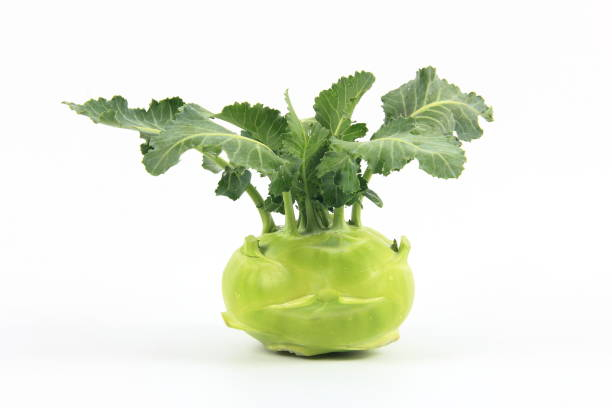
High in nutrients 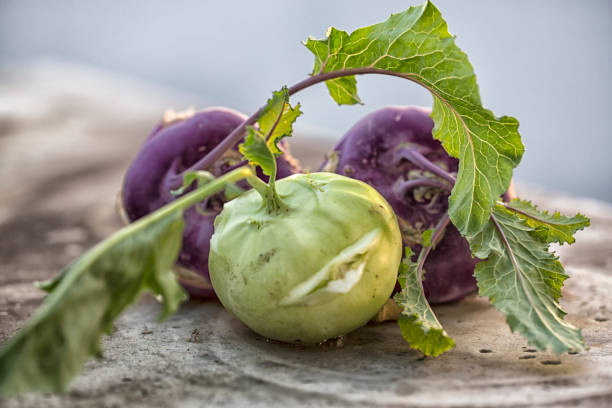
High in nutrients -
Kohlrabi is high in antioxidants such as vitamin C, anthocyanins, isothiocyanates, and glucosinolates. These plant components protect your cells from free radical damage, which can raise your risk of illness. Diets rich in antioxidant-rich vegetables, such as kohlrabi, have been linked to a lower incidence of diabetes, metabolic illness, and premature mortality.
Purple kohlrabi skin contains a high concentration of anthocyanins, a kind of flavonoid that gives plants and fruits their red, purple, or blue color. Anthocyanin consumption has been related to a decreased risk of heart disease and may possibly help cognitive function. Kohlrabi is high in isothiocyanates and glucosinolates, both of which are potent antioxidants linked to a decreased risk of some malignancies, heart disease, and inflammation.
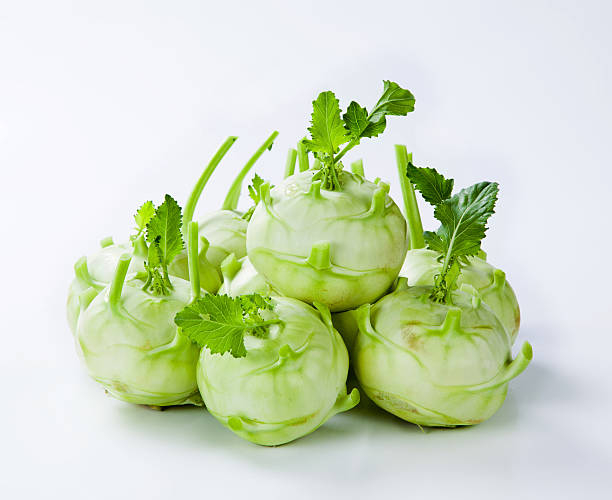
High in antioxidants 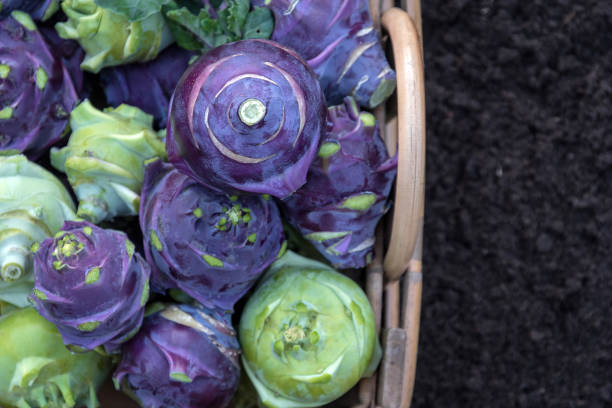
High in antioxidants -
Kohlrabi is high in both soluble and insoluble fiber. The former is water-soluble and aids in the maintenance of normal blood sugar and cholesterol levels. Insoluble fiber, on the other hand, is not broken down in your colon, so it adds volume to your stool and promotes regular bowel movements.
Furthermore, fiber is the primary fuel source for beneficial gut bacteria such as Bifidobacteria and Lactobacilli. These bacteria create short-chain fatty acids, which fuel your gut cells and may protect you from heart disease and obesity. Healthy gut flora may also be linked to a stronger immune system and a decreased risk of obesity and bowel illness.
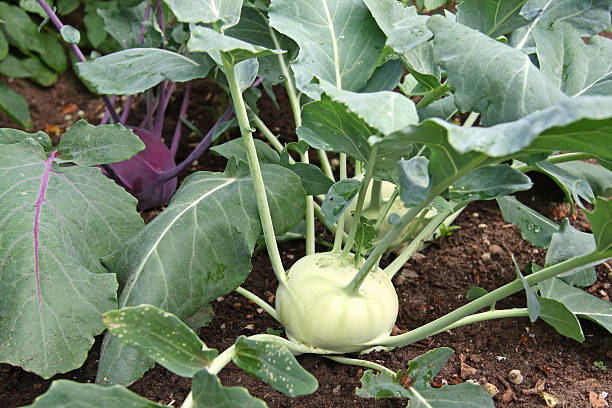
Promotes a healthy gut 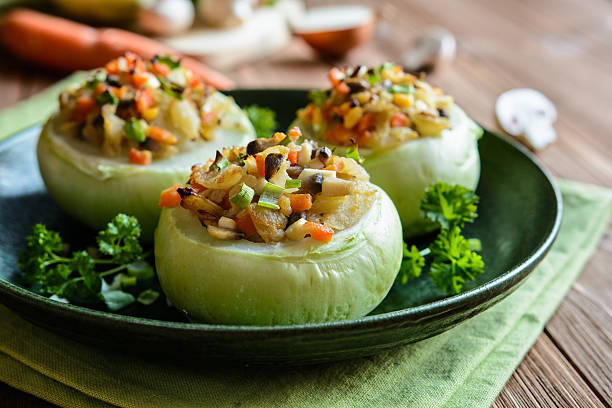
Promotes a healthy gut -
Kohlrabi includes glucosinolates and isothiocyanates, which are strong plant chemicals found mostly in cruciferous vegetables. Because of its potential to expand blood vessels and decrease inflammation, glucosinolate consumption has been associated with a lower risk of heart disease. Isothiocyanates also have antioxidant capabilities that may help reduce plaque development in your arteries. Long-term research of 1,226 women aged 70 and up discovered that consuming cruciferous vegetables was connected with a 13% decreased risk of mortality from heart disease for every 10-gram increase in fiber intake per day.
Purple kohlrabi is also abundant in anthocyanins, which may help decrease blood pressure and reduce your risk of stroke. Finally, a high fiber diet may help to prevent heart disease. According to one evaluation of 15 research, a diet high in this nutrient reduced the risk of mortality from heart disease by 24% when compared to low fiber diets.
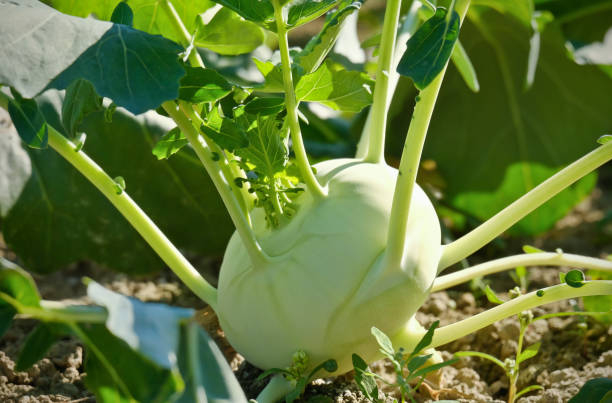
May lower your risk of heart disease 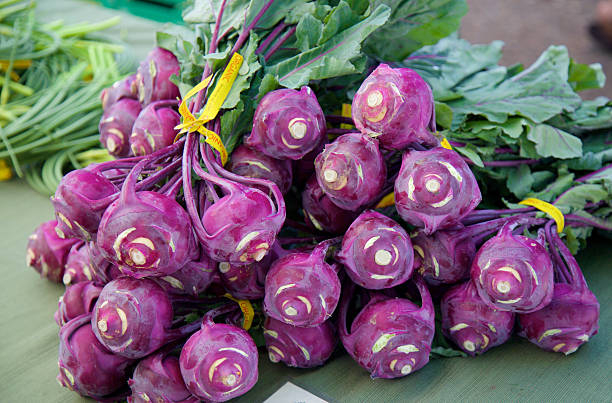
May lower your risk of heart disease -
Kohlrabi has nutrients that may help your immune system. This vegetable has a lot of vitamin B6, which is essential for a variety of processes like protein metabolism, red blood cell growth, and immunological function. Vitamin B6 is required for the creation of white blood cells and T-cells, which are immune cells that fight foreign substances and are essential for a healthy immune system. A lack of this vitamin has been related to a compromised immune system.
Furthermore, kohlrabi is high in vitamin C, which may help white blood cell activity and, as a result, enhance your immune system. Kohlrabi is high in minerals and antioxidants, which may help your immune system and lessen your risk of chronic illness. Its fiber content also promotes a healthy gut microbiota.
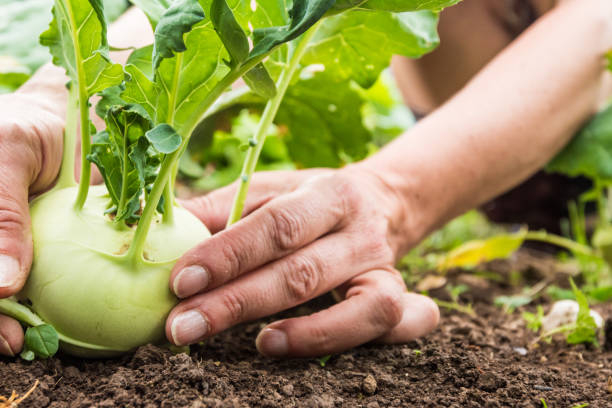
Supports a healthy immune system 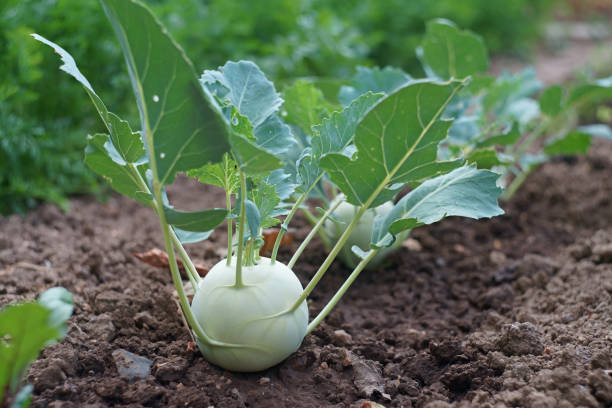
Supports a healthy immune system -
Kohlrabi may be high in potassium, and while this aspect of potassium isn't commonly emphasized, it is one of the essential players in muscle and nerve function in the body. Every day, it helps us move, breathe, respond, and operate. As a result, enough levels of this mineral-and, as previously said, the high potassium content in this vegetable may make it a perfect addition to your diet to keep you awake, energetic, and in the terrific form!
In research, Dr. Jiang He of Harvard University discovered that, in addition to its effect on energy levels, potassium also acts as a vasodilator, lessening the strain on the cardiovascular system by alleviating blood vessel and artery stress. This can improve circulation throughout the body, oxygenate important tissues, and reduce the risk of cardiovascular events such as strokes or heart attacks. Potassium also plays an important role in fluid management in the body, collaborating with sodium to regulate fluid transport between cells.
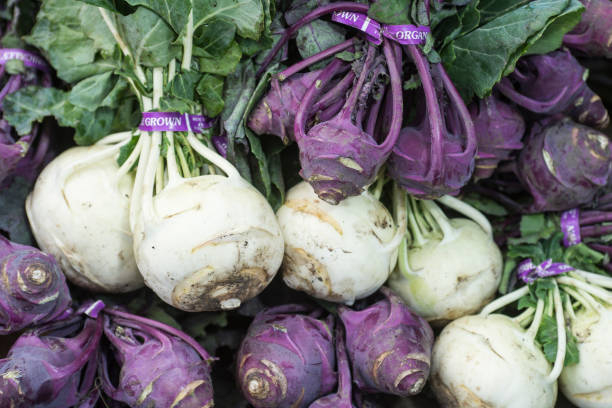
May boost energy level and regulate blood pressure 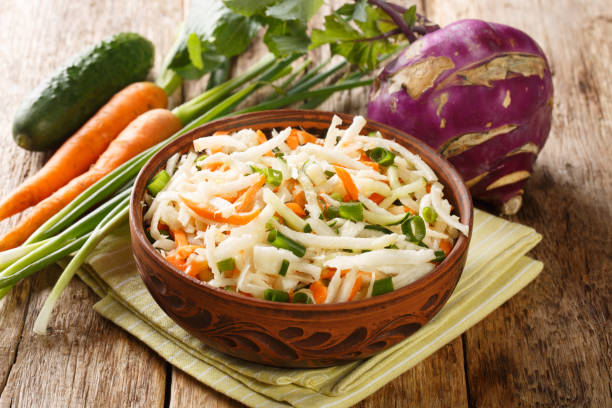
May boost energy level and regulate blood pressure -
Kohlrabi may contain iron in addition to potassium. The considerable iron levels present in kohlrabi go hand in hand with the potassium concentration; iron helps to build the body's red blood cells (RBC), which are necessary to avoid anemia (iron deficiency). Weakness, weariness, headaches, gastrointestinal issues, confusion, and overall immune system failure are symptoms of this insufficiency. Kohlrabi contains calcium, which may aid in the absorption of iron by the body, making it an all-around immune and cardiovascular system booster.
Your bones naturally deteriorate as your age, but consuming mineral-rich meals is one of the greatest methods to avoid or considerably decrease that process. Some of these foods include kohlrabi, which has high manganese, iron, and calcium content.
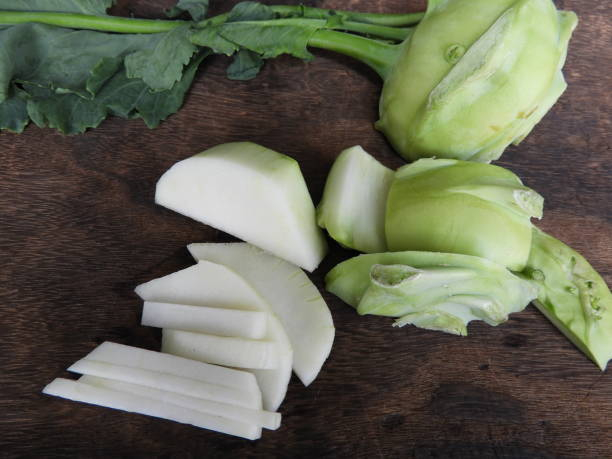
May prevent anemia and improve bone strength 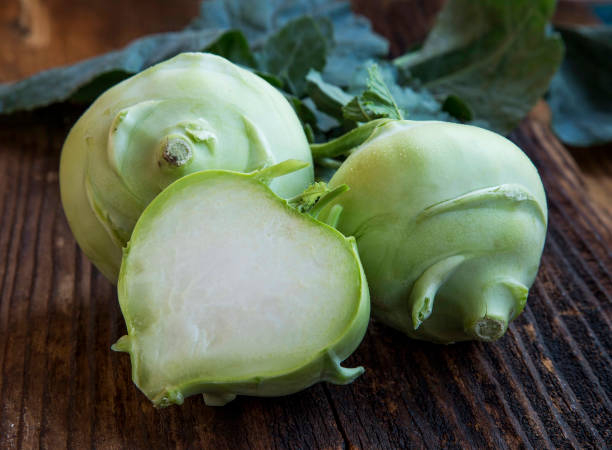
May prevent anemia and improve bone strength -
Just like most cruciferous vegetables, kohlrabi may be a good source of dietary fiber that can seriously improve digestive health. Fiber helps to move your bowels, reducing constipation, cramping, and bloating, and generally improving the quality of your gastrointestinal system, while also maximizing your nutrient uptake efficiency.
According to a 2013 study published in the journal Clinical Interventions in Aging, kohlrabi may be a good source of carotenes, especially beta-carotene, which serves as an antioxidant in the body, particularly in the ocular region. Vitamin A can help prevent macular degeneration and slow or prevent the formation of cataracts. This is accomplished by neutralizing free radicals and avoiding oxidative stress in the eye. Eating kohlrabi may help lower the chance of acquiring cancer, according to research published in the journal Preventive Nutrition and Food Science, since it includes strong phytochemicals such as isothiocyanates, sulforaphane, and indole-3-carbinol.
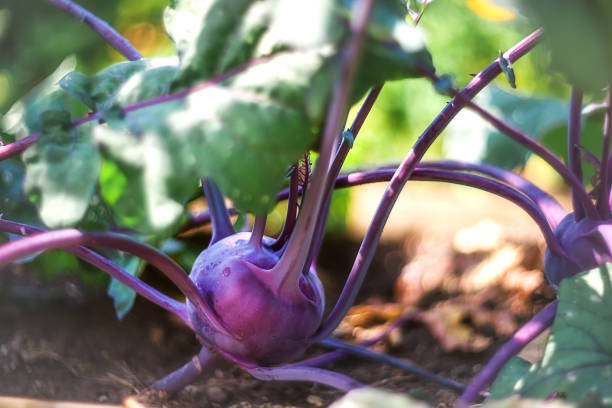
May improve digestion and aid in eye care 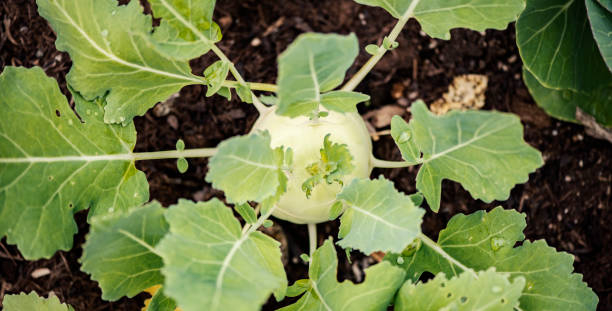
May improve digestion and aid in eye care





























